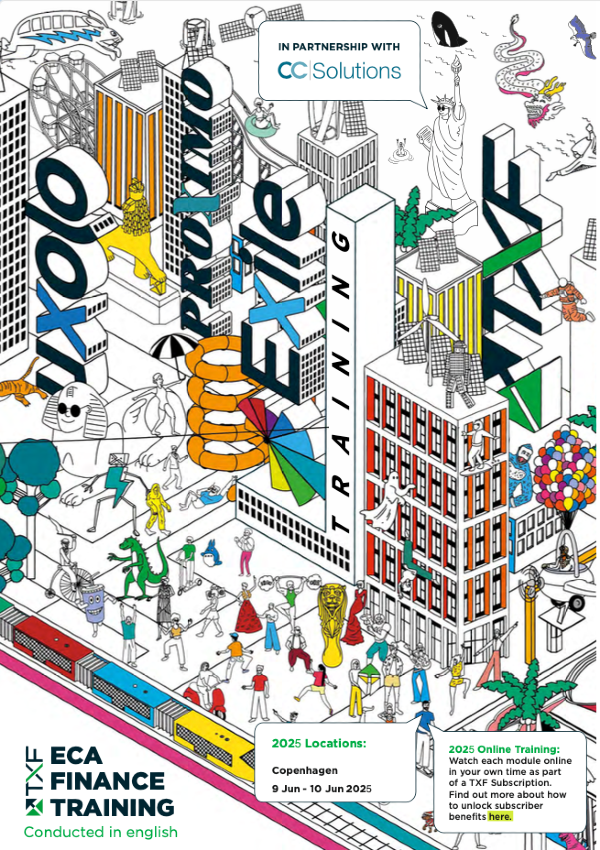Shop talk: EXIM Hungary ups activity in Central Asia
TXF spoke with Robert Griljov, director of business operations in Eastern Europe and Central Asia at EXIM Hungary, to outline the role state intervention and foreign investment is playing in these markets with historically close economic ties to Russia.

Trade has been prospering for two thousand years along the former Silk Road. But in Central Asian former Soviet republics, government attempts are well under way to boost their respective economies either via strong state intervention or significant foreign investments - or a bit of both.
The combination of the two has resulted in an impressive economic opening in recent years. In effect, a paradigm shift gave way to foreign capital. TXF spoke with Robert Griljov, director of EXIM Hungary, who is responsible for business operations in Eastern Europe and Central Asia, about the potential of the markets in the region and its traditionally active Russian economic relations.
TXF: As our previous interview revealed, there is a wide variety in the activities of EXIM Hungary – there are transactions in Egypt, Ghana, Brazil and Indonesia – but what is the situation in Central Asia? What potential do you see in the region?
Robert Griljov (RG): We can proudly state that despite being a “small” ECA, we are able to support Hungarian companies with financial solutions all over the world. We have risk limits in 131 countries, and to date Hungarian enterprises have finalised transactions in 55 countries with the help of our financial solutions. Looking back over our 26-year operation, we granted credit, guarantee and/or insurance in more than 100 countries.
As for Central Asia, we’ve gained a strong foothold as there’s been a robust upswing in deals in the region in recent years. The financing activity of international financial institutions (IBRD, EBRD, ADB, AIBB, etc.) is impressive: for instance, they invested $5.8 billion in 2019 and $6.7 billion in the first nine months of 2020. Investments could even grow last year during the Covid-19 epidemic. These figures are especially notable in comparison with data about Russian investments during the same period ($0.4 billion and $1.7 billion).
EXIM Hungary has been present in the CIS region ever since its foundation in 1994. We participated in several successful major investments, project financings and insurance activities in these countries. Considering our experiences accumulated over the past 26 years, we dare to say that we have a profound understanding and knowledge of the region. Russia was clearly in the interest of European companies until the beginning of the 2000s, though several changes took place in Russia’s economic and financial policy after 2008 that encouraged foreign capital to seek new markets. It was then when European companies – including Hungarian enterprises - became interested in Central Asia.
TXF: Where in Central Asia do you and Hungarian export companies have the most intensive economic relations?
RG: I would like to mention Kazakhstan and Uzbekistan, particularly. The Hungarian-Kazakh economic relations are so intensive that we were also required to open an office in Nur-Sultan last year besides the long-established office in Moscow.
At present, we finance and insure the export of plant protection products and waste treatment equipment here and we grant export credit insurance for the export of pharmaceutical, plastic industrial and agricultural products. The Kazakhstan Hungarian Investment Private Equity Fund C.V. has been operating for five years, as a result of which, a project was set up to start apple production. In the near future we intend to provide support for the market entry of Hungarian products and services in further branches. Road construction and public lighting development will be high on the agenda.
TXF: And what is the situation in Uzbekistan, where there is a considerable economic opening taking place, a country that significantly lags behind the Kazakh market?
RG: This is also our impression. Uzbekistan is an unavoidable market between China and Europe with its half-a-million square-kilometre territory and 34 million inhabitants. Moreover, in the past four years the legal framework of the interest representation of foreign investors was set up. On the other hand, the Uzbekistani currency, the soʻm became convertible. Free trade zones were also established where enterprises established by foreign investors can receive support and substantial tax benefits.
Naturally, we and the Hungarian enterprises also noticed these notable changes. The international investment environment did likewise as a lot of investments were launched and plenty of working capital arrived in the country. We aim to expand the room for manoeuvre of Hungarian ventures by offering competitive financial solutions. Our first major transaction was finalised recently — a mainly state-owned Uzbek bank has purchased 1000 ATMs produced in Hungary. The almost $10 million worth of buyer credit and export credit insurance used as collateral of the resource was also granted by EXIM Hungary.
In addition, the preparation of several joint Hungarian-Uzbek investments related to cattle breeding, cereal processing, vegetable oil plant construction, fish farm installation, hotel development and public utility meter production are now under way. We will also be involved in these business opportunities as reliable financing partners. As for short-term insurances, we actively promote business agreements in the agricultural, pharmaceutical and chemical sectors and in cooperation with the World Bank Group we also took part in successful agricultural projects.
TXF: Can we state then that you are playing a more active and key role in the market access of Hungarian companies in Central Asia?
RG: Undoubtedly. The main mission of EXIM Hungary is to support Hungarian exporters, to facilitate their entry to the foreign markets and to strengthen their competitiveness on these markets. Requests for Hungarian exports from markets where we are legally able to provide financial services serve as an indicator for us to examine the region from the point of view of business development. We usually visit the region, identify the relevant actors and assess how we can support companies in the local environment, and what are the solutions whereby we can facilitate them in starting their successful business activity.
TXF: As you have mentioned, Hungarian-Russian relations have a long history…can you explain a little more about this please?
RG: Indeed, bilateral relations have been traditionally strong — Russia is an important market for Hungarian exporters and we are present both in the field of financing and insurance. The Hungarian export of pharmaceutical and agricultural products should be highlighted and in the case of our short-term insurances, the proportion of Russian transactions is highly significant.
Of course, it is understandable as we have been present in this market since our establishment in 1994 (we had no access to the markets of the so-called developed OECD countries before the Covid-19 pandemic). Before 2008, we participated in numerous municipal projects in Russia due to the fact that local governments could also get indebted in foreign currency. Since then, classic ECA finance has not been able to compete with the favourable Russian Rouble credits, thus we are mainly active in the field of short-term insurances — so at present, this is the area where we can provide support for Hungarian enterprises.
We can cooperate with the Russians in the field of more project financing and in the financing of development projects in third world countries. The best example of the former activity is a mainly export-oriented meat processing plant established with Hungarian capital and an example of the latter is the railway carriage manufacturer in Egypt.
TXF: In what sectors do Hungarian companies have a chance to enter the Russian market?
RG: I belief that there are Hungarian products and services in each sector that can compete with western European products and services in quality. It is important as we are witnessing an increasingly strong quality competition on more and more foreign markets, including in Russia while at the same time, the cost side continues to be a decisive factor in making business decisions. The demand is for “Good quality at reasonable prices”. Hungarian exporters are able to meet this demand by connecting quality products and services with favourable EXIM Hungary financing.





